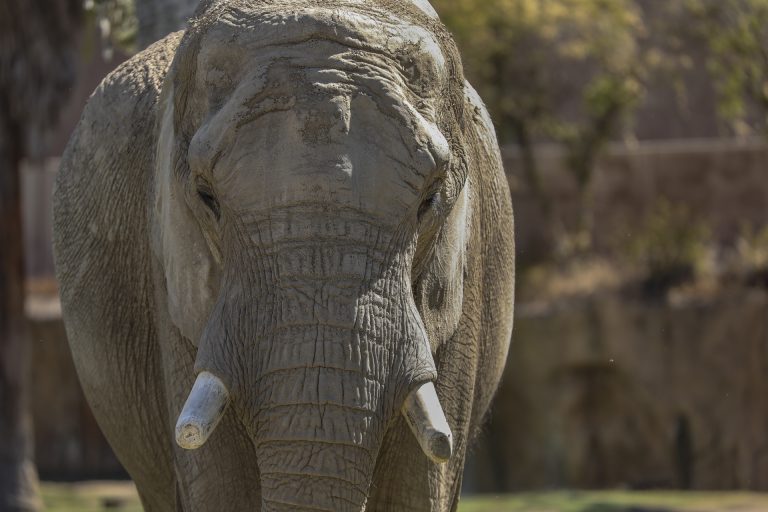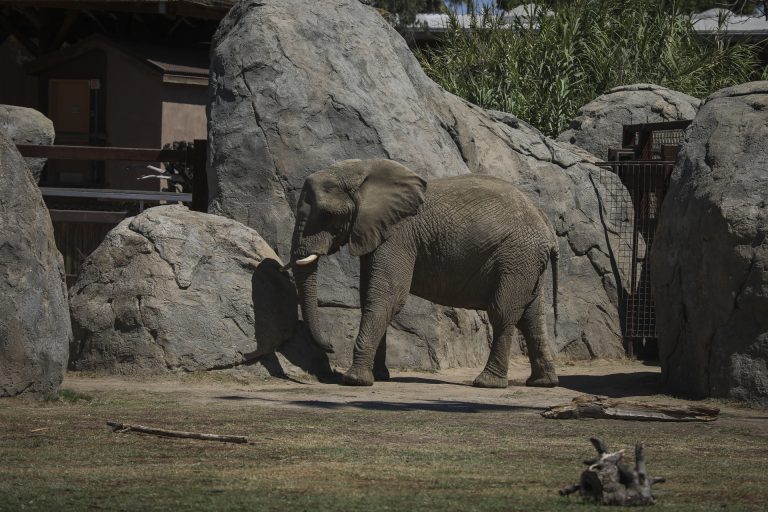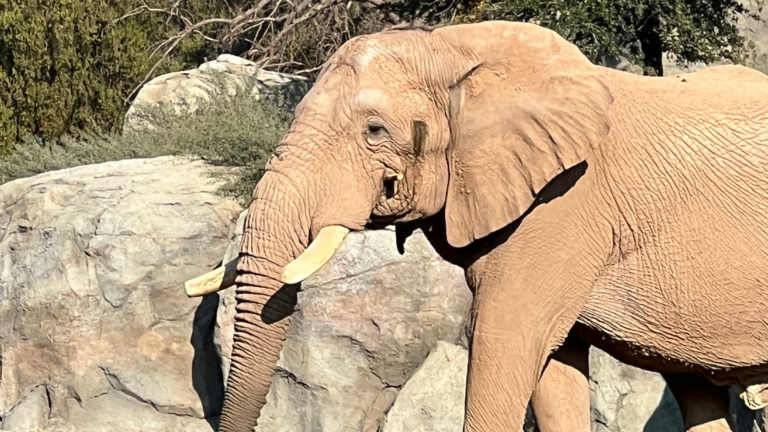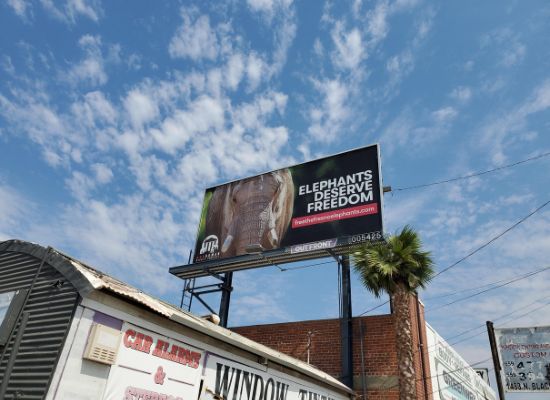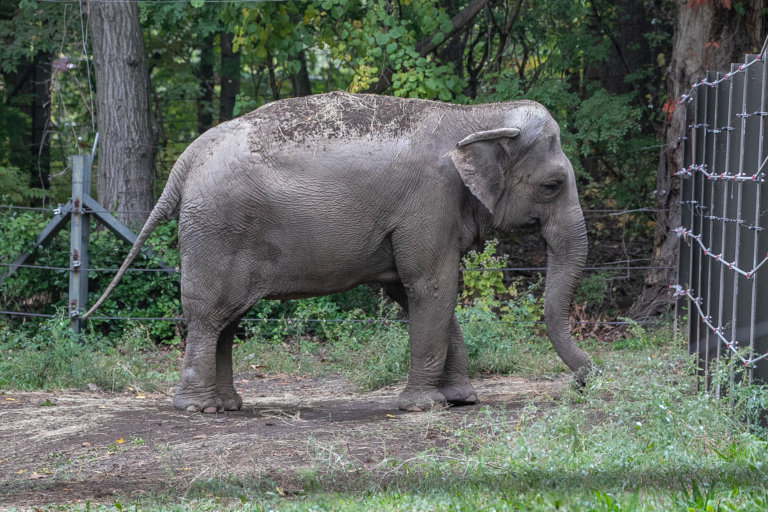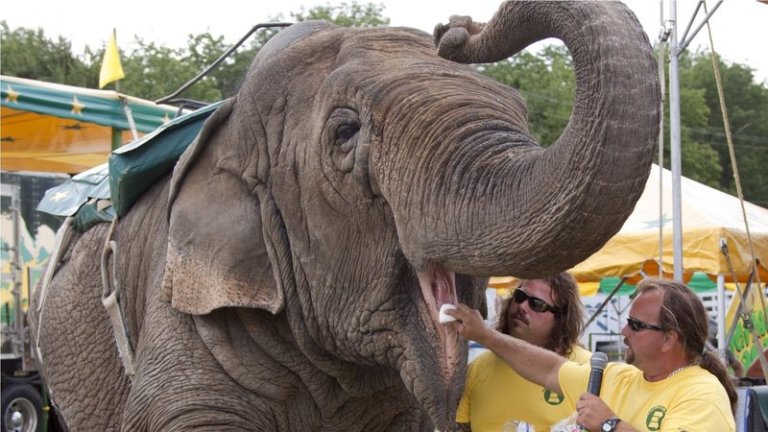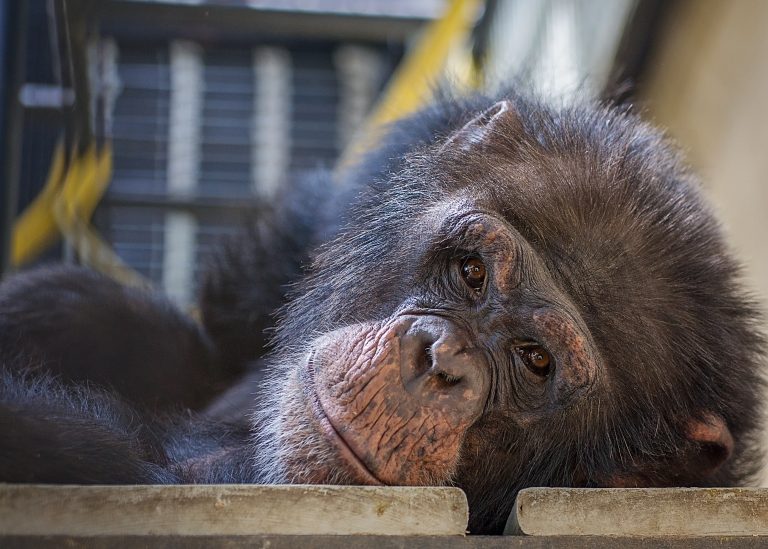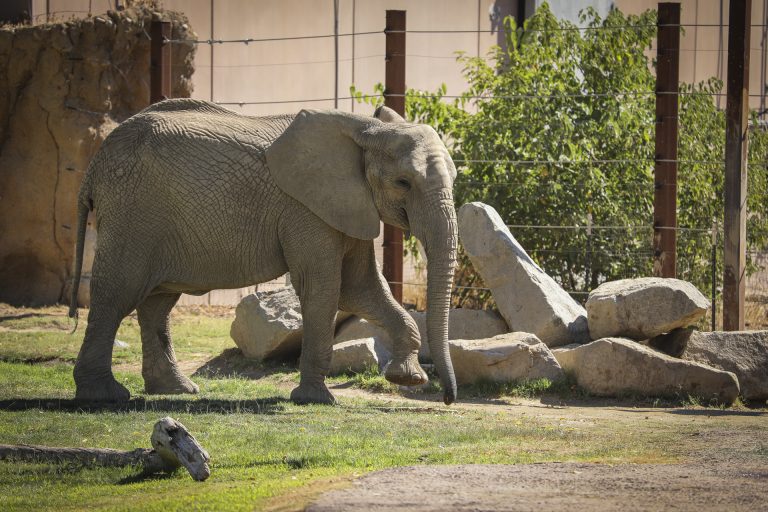
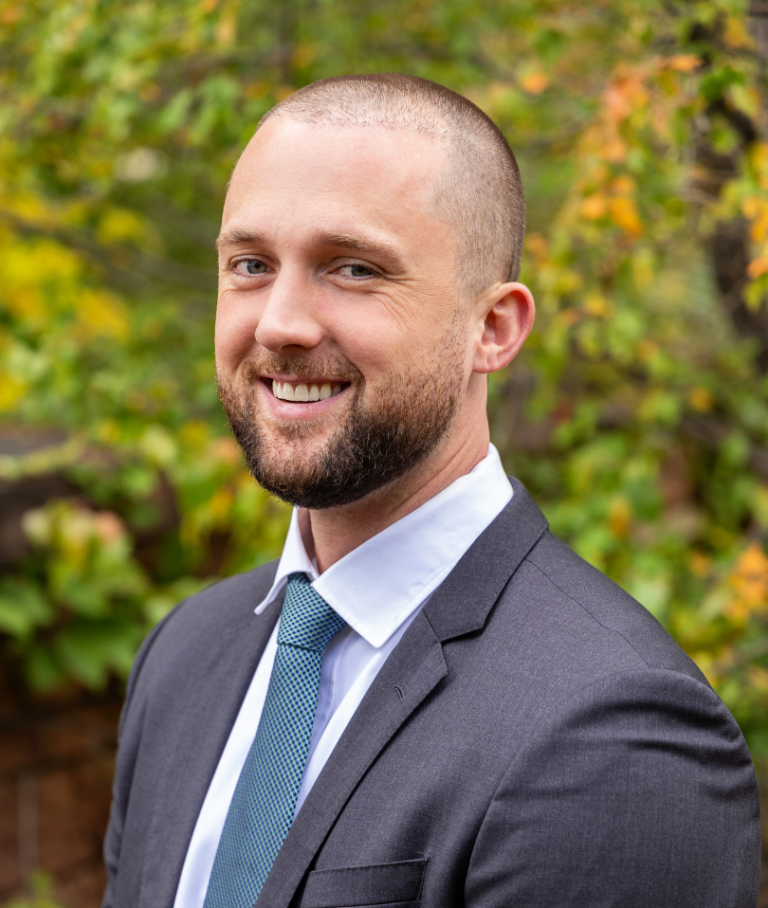
Amahle, Nolwazi, and Mabu
Nolwazi is a female African elephant believed to be 28 years old. She was born in Hlane National Park in Eswatini (formerly known as Swaziland).
Amahle is a female African elephant believed to be 13 years old. She is Nolwazi’s daughter and was also born in Hlane National Park.
Nolwazi and Amahle were among 39 elephants who roamed approximately 12,000 acres of the 54,000-acre park. In 2016, they and 15 other elephants, most of them breeding-age females, were taken from their natural habitat and imported to US zoos–a highly controversial arrangement which Charles Siebert detailed in a 2019 investigative essay for The New York Times Magazine (“Zoos Called It a ‘Rescue.’ But Are the Elephants Really Better Off?”).
As Siebert wrote:
Conservation managers in Swaziland determined that the increasing number of elephants in two of the country’s three Big Game Parks (B.G.P.) reserves were overtaxing the already drought-stricken landscape and posing a threat to the planned growth of their populations of both black and white rhinos. In response, the founder and executive director of B.G.P., Ted Reilly, decided to reduce the elephant population. Relocating them elsewhere in Africa was deemed, in the wording of the exhibit, ‘not feasible,’ and thus Reilly declared that they would have to be slaughtered if alternate homes couldn’t be found.
Three US zoos–the Dallas Zoo in Texas, the Sedgwick County Zoo in Wichita, Kansas, and the Henry Doorly Zoo and Aquarium in Omaha, Nebraska–then agreed to donate $450,000 to Big Game Parks as part of a relocation deal, with B.G.P. ignoring offers to give refuge to the elephants in Africa, according to Siebert.
In 2016 the US Fish & Wildlife Service approved the zoos’ request despite global public outcry, including from 80 respected elephant and conservation experts around the world and in the face of a lawsuit filed in the US by Friends of Animals to try to stop the importation. Nolwazi, Amahle, and the other elephants were sedated, crated, and loaded onto a cargo plane and split up across the three zoos. Nolwazi and Amahle spent two years in captivity in the Dallas Zoo before they were transferred to the Fresno Chaffee Zoo, where they remain today. The zoo’s deputy director has said the zoo plans to use them for breeding: “We have been looking to grow our African elephant herd. Having Nolwazi and Amahle join enables us to do that.”
Mabu was born in 1990 in the Kruger National Park in South Africa. At some point between his birth and 2003, he was transported to the Mkhaya Game Reserve in eSwatini. In 2003, he and ten other elephants were imported to the US despite public outcry and legal opposition. Mabu was sent to the San Diego Zoo Safari Park where, between 2006 and 2011, he fathered ten offspring with the female elephants held in captivity with him.
In 2012, Mabu, two of his young sons, and two adult female elephants were transferred to the Reid Park Zoo in Tucson, AZ to establish a new group of captive elephants there. In 2014 an elephant he was held captive with gave birth to an elephant he fathered. In 2016 he was transferred back to San Diego to again breed with the adult females at that zoo. In 2018, two elephants he fathered were born in San Diego. That same year he was transferred back to the Reid Park Zoo to again breed with the female elephants held captive there. Shortly after, his eleven-year-old son died in Tucson. In 2020 an elephant he fathered was born at the Reid Park Zoo. According to the zoo, Mabu formed close bonds with his offspring at the Reid Park Zoo; the elephants he lived with missed him when he would be separated from him while being crate trained before one of his transports.
In November of 2022, upon the recommendation of the AZA, he was transferred to the Fresno Chaffee Zoo to breed with Nolwazi and Amahle.
Vusmusi (also known as Moose and Musi) is an 18-year-old male African elephant. He was born in the San Diego Zoo Safari Park to an elephant named Ndulamitsi, who was pregnant with him when she was imported to the US from eSwatini in 2003, also despite global public outcry and with zoo and eSwatini officials making the same claims about the elephants needing to be killed otherwise.
Vusmusi was transferred from San Diego to the Fresno Chaffee Zoo in 2015. In 2017, after he cracked and broke his tusks numerous times, the zoo had metal covers made for them, which other zoos have also done. “He had a history of being tough on his tusks, and he would break them on things,” Fresno Chaffee Zoo’s curator for elephants told the Sacramento Bee in 2017. As Keith Lindsay writes in his affidavit (but the zoo has not acknowledged in news stories touting the metal covers), this behavior is “an unnatural behavior indicative of stress and/or boredom” (elephants living freely in their natural habitats use their tusks “to pry bark off trees or dig for roots, and in social encounters as an instrument of display or as a weapon”). The zoo planned to use Vusmusi for breeding but were not successful in their efforts. Upon the recommendation of the AZA, they transferred him back to San Diego. He is now out of the jurisdiction of this lawsuit but we’ll continue to fight for his freedom.
The Fresno Chaffee Zoo
In 2022, the Fresno Chaffee Zoo was named one of the 10 Worst Zoos for Elephants in the US by In Defense of Animals. This designation comes seven years after the zoo remodeled its elephant exhibit at a cost of $55.7 million.
IDA based its assessment of the Fresno Chaffee Zoo in part on the fact that three of the elephants in its custody died prematurely in a relatively short period of time. Amy, a 30-year-old wild-born African elephant, was euthanized two years after arriving at the zoo because of a torn ligament in her leg that impacted her mobility. Kara, a 42-year-old wild-born Asian elephant, was euthanized because of pain from chronic osteoarthritis after spending 34 years in captivity in the zoo.
In 2019, several months after Nolwazi and Amahle’s arrival at the zoo, Amy’s daughter, Miss Bets–originally presented by the zoo as being a similarly aged companion for Amahle–died from EEHV, an elephant herpesvirus that causes hemorrhagic disease. It was not detected until after Miss Bets’ autopsy. That same year, Amahle was diagnosed with EEHV. Upon her diagnosis, she “went to restraint school real fast,” the zoo’s Chief Veterinary Officer and Curator of Elephants wrote of her treatment plan in a PowerPoint presentation delivered as part of a 2020 African Elephant EEHV Workshop.
Keith Lindsay sees Amy and Miss Bets’ deaths as “indicative of a poor husbandry record” at the zoo.
The elephant exhibit is approximately four acres, although the area able to be used by the elephants appears to be approximately three acres, according to elephant expert Keith Lindsay in an affidavit submitted in support of this case. When the remodeled exhibit opened, the then zoo director said: “Elephants also will live in a typical matriarchal setting as they do in Africa … The zoo will start with three and could build up to six or eight on the 4-acre portion of the expansion.” The exhibit consists of an outdoor yard with a pond-like water feature that separates the elephants from the rhinos, a waterfall-like water feature, a fake rock wall with holes the elephants can reach into to grab food, and a pole with hay hanging from it.
The exhibit is across from a nightclub and restaurants and surrounded by major transportation arteries and railways. When the handlers are off duty or it’s too cold outside, the elephants are further confined in a largely concrete barn.
The yard is separated into a front and back yard with a gated walkway the elephants can pass through to access each yard. The elephants appear to be able to access the barn from both sections of the yard. There is also a small pen that the elephants are put in for public training sessions.
The primary substrate of the exhibit is natural grass, and there are different types of trees the elephants are able to touch. Some trees appear to be wrapped in wireto prevent the elephants from touching them.
The NhRP’s Change.org petition calling for sanctuary for Nolwazi, Amahle, and Vusmusi has over 30,000 signatures and continues to grow.
Jake Davis
The NhRP attorney who will argue Nolwazi, Amahle, and Mabu’s case
Jake is the lead attorney for the NhRP’s California litigation. Previously, Jake worked in federal court (under the Honorable S. James Otero of the United States District Court for the Central District of California), for the U.S. government (at the United States Attorney’s Office for the Southern District of California), and in private practice (Squire Patton Boggs). He holds a J.D. from Loyola Law School, Los Angeles, and a B.A. from Emory University in Atlanta, Georgia. He is a proud human to a rescued pitbull dog named Archie.
Who's joined us in the fight
Scientific support
“The NhRP’s litigation to free the Fresno elephants is the first of its kind on the West Coast and has the support of world-renowned elephant experts including Dr. Bob Jacobs, who has studied the severe negative neurological impacts of captivity on elephants.”
Donate to support the fight
Donate online
Mail a check
611 Pennsylvania Ave SE #345
Washington, DC 20003
Planned giving
Create a fundraiser
Highlights from the fight
Media coverage
A timeline of Amahle, Nolwazi, and Mabu’s case
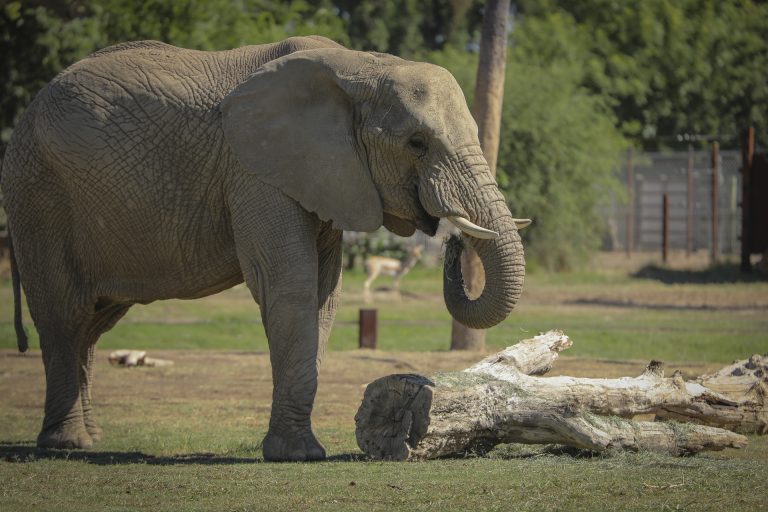
5.3.22
The NhRP files a habeas corpus petition in the San Francisco Superior Court, demanding recognition of Amahle, Nolwazi, and Vusmusi’s right to liberty and their release from the Fresno Chaffee Zoo to an elephant sanctuary.
The Fresno Chaffee Zoo’s “imprisonment of Amahle, Nolwazi, and Vusmusi,” the NhRP writes, “violates their common law right to bodily liberty protected by habeas corpus and is therefore unlawful because it deprives the elephants of their ability to meaningfully exercise their autonomy and extraordinary cognitive complexity, including the freedom to choose where to go, what to do, and with whom to be. Whether Respondents are in compliance with animal welfare statutes is irrelevant to the lawfulness of the elephants’ imprisonment as none of those statutes address the right to bodily liberty.”
In an affidavit submitted with the petition, elephant expert Dr. Keith Lindsay describes the physical and psychological suffering of the Fresno elephants caused by their lack of freedom:
The life of these three elephants at Fresno Chaffee Zoo is nothing but a succession of boring and frustrating days, damaging to their bodies and minds, and punctuated only by interaction with their keepers. Their physical and psychological health has been severely compromised by the sustained deprivation of their autonomy and freedom of movement. They spend at least half, if not more, of each day in a barn with very little cushioning for their feet and joints. When allowed outside, they are unable to walk more than 100 yards in any direction, they have limited shade from the sun, and their artificial water features are not deep enough to allow proper bathing. The elephants receive predictable enrichment activities, are unable to communicate over large distances, and their acute hearing is bombarded by constant auditory disturbances from major transportation arteries on all four sides of their enclosure.
Read and download the affidavits submitted in support by Keith Lindsay, Lucy Bates and Richard W. Byrne, Bob Jacobs, Karen McComb, Cynthia Moss, and Joyce Poole.
Read our press release here.
6.13.22
The Fresno Chaffee Zoo files an emergency motion asking the San Francisco Superior Court to transfer the venue of the case from San Francisco to Fresno. Following a short hearing, the Court denies the Fresno Chaffee Zoo’s emergency motion asking the Court to transfer venue on procedural grounds, ruling that the zoo has to submit its transfer request by regularly noticed motion, which gives the NhRP time to reply in opposition. The Fresno Chaffee Zoo files a noticed notion the same day.
6.27.22
The NhRP files our opposition to the Fresno Chaffee Zoo’s motion asking the court to transfer venue. In it, we make clear that a transfer can only be ordered for a substantial reason, and no substantial reason exists in this case. Moreover, the Fresno Chaffee Zoo is wrong to request a transfer on the grounds that the zoo is in Fresno and the Fresno County community “stands the most to lose from the [elephants’ habeas corpus] petition.” As we write, this argument “completely ignores that this is a habeas corpus proceeding. Whether the Fresno County community may want to see Amahle, Nolwazi, and Vusmusi kept at the zoo is no basis for transferring the Petition. When an individual is illegally imprisoned, it is irrelevant whether members of the community want to see that individual kept in prison.”
7.1.22
7.27.22
The NhRP files a petition for a writ of mandate in the 1st District Court of Appeal (the relevant appellate court) in order to challenge the transfer order. We argue the transfer order is invalid because the Court failed to provide a substantial reason for transferring our case, and the erroneous reason it gave (i.e., that the NhRP is challenging the elephants’ conditions of confinement in Fresno as one might in an animal welfare case, while we’re actually challenging the legality of their imprisonment) could adversely impact our case in the Fresno Superior Court if the transfer order is allowed to stand. Our petition asks the appellate court to stay further proceedings until it has decided our petition for a writ of mandate.
8.3.22
The 1st District Court of Appeal denies the NhRP’s requested writ of mandate.
8.11.22
The NhRP sends a letter to lawyers for the Fresno Chaffee Zoo, offering to drop the lawsuit if the zoo agrees to release the elephants to a sanctuary.
8.15.22
The Fresno Superior Court files the case and notices the receipt of papers and pleadings.
8.16.22
The Fresno Chaffee Zoo responds to our letter offering to drop the lawsuit if the zoo agrees to release the elephants to a sanctuary.
8.22.22
The NhRP files a motion for an order transferring the elephants’ case back to the San Francisco Superior Court. The San Francisco Superior Court had previously ordered the case transferred to the Fresno Superior Court on the basis of a rule that permits a court to transfer a case to the county in which the habeas petitioner is confined if the habeas corpus petition “challenges the conditions of an inmate’s confinement.” This reason for transfer, the NhRP argues, is inapplicable because the petition, importantly, does not challenge the conditions of the elephants’ confinement at Fresno Chaffee Zoo, but rather the legality of their imprisonment itself.
8.26.22
The Fresno Chaffee Zoo files a peremptory challenge asking for Fresno County Judge Stephanie Negin to be removed from the case, which the zoo can do under California law without being required to establish prejudice.
8.30.22
The Fresno Chaffee Zoo’s peremptory challenge is granted, and Fresno County Judge Mark Cullers is assigned to the case.
8.31.22
The Fresno Chaffee Zoo files its opposition to our motion to send the case back to San Francisco.
9.7.22
The NhRP files a reply to the Fresno Chaffee Zoo’s opposition to our motion to send the case back to San Francisco.
9.14.22
NhRP Staff Attorney Jake Davis argues before Fresno Superior Court Judge Mark Cullers in a hearing on our motion asking the Court to transfer the elephants’ case back to the San Francisco Superior Court. Adam Hofmann, arguing for the Fresno Chaffee Zoo, argued that the NhRP’s petition does challenge the conditions of the elephants’ confinement and that this case belongs in Fresno because that’s where the elephants are located. At the conclusion of the hearing, Judge Cullers denies the NhRP’s motion, stating he agrees with San Francisco Superior Court Judge Richard Ulmer’s ruling (which granted the Fresno Chaffee Zoo’s motion to transfer venue) and what the Fresno Chaffee Zoo had argued. This means the case will stay in the Fresno Superior Court, where Judge Cullers will rule on the merits of the NhRP’s habeas corpus petition.
10.17.22
The NhRP files a Notice and Request for Ruling.
10.18.22
Judge Cullers responds to the NhRP’s Request for Ruling by asking the Fresno Chaffee Zoo to submit an “informal response,” a unique responsive pleading that asks Respondents to refute the habeas corpus petition without the formality of a Return (which is required if an Order to Show Cause is issued).
10.19.22
10.14.22
The NhRP is notified we’ve been assigned to Judge Gary Orozco for all purposes, and the elephants are issued a new case number (22CRWR686796).
11.1.22
The NhRP files a Peremptory Challenge to Judge Orozco presiding over the case.
11.3.22
The NhRP is notified we’ve been assigned to Judge Arlan L. Harrell for all purposes.
11.12.22
The NhRP learns the Fresno Chaffee Zoo has transferred Vusmusi back to the San Diego Safari Park and brought in another elephant, Mabu, to be used for breeding upon the recommendation of the Association of Zoos & Aquariums (AZA). We post a short statement on social media.
11.15.22
Judge Harrell denies the elephants’ habeas corpus petition on the grounds that the petition does not allege, as the Court believes it must, that the elephants are held in “state custody” (due to, for example, a prison sentence imposed by a court). We announce we will challenge this decision and will share our next legal steps in the coming weeks. We also announce our plans to take on Mabu as a client.
2.14.23
The NhRP files a new habeas corpus petition in the Fifth District Court of Appeal, demanding Amahle, Nolwazi, and Mabu’s right to liberty and their release to a sanctuary or a rewilding facility. The petition details how the Fresno Superior Court was wrong to deny the NhRP’s first petition on the grounds that the petition didn’t allege that the elephants are held in state custody: under longstanding California law, you don’t have to be in state custody in order to challenge your imprisonment. “The practical effect of the Superior Court’s decision prohibits privately detained humans from availing themselves of habeas corpus,” the NhRP writes. Read our press release here.
5.17.23
The NhRP sends a letter to the Fifth District Court of Appeal, urging it to rule on Amahle, Nolwazi, and Mabu’s habeas corpus petition.
5.18.23
The Fifth District Court of Appeal summarily denies Amahle, Nolwazi, and Mabu’s habeas corpus petition.
8.28.23
The NhRP files a petition for a common law writ of habeas corpus in the California Supreme Court, arguing Nolwazi, Amahle, and Mabu are entitled to a hearing to determine whether they must be released from their unjust imprisonment in the Fresno Chaffee Zoo. The NhRP is also asking the Court to reject Judge Harrell’s November 2022 order and clarify that an individual doesn’t need to be in state custody in order to meet habeas corpus jurisdictional requirements.
8.29.23
Amicus/amici letters are submitted in support of the NhRP by The Hon. Edwin Cameron (a retired judge who served as a Justice of the Constitutional Court of South Africa), David Favre (Nancy Heathcote Professor of Property and Animal Law at Michigan State College of Law), Stephen Tauber (Professor of Political Science in the School of Interdisciplinary Global Studies at the University of South Florida), Maneesha Decka (Professor and Lansdowne Chair in Law at the University of Victoria, Faculty of Law in Victoria, British Columbia), and Dr. Andrew Linzey and Dr. Clair Linzey (Professors of Animal Theology affiliated with the Oxford Centre for Animal Ethics).
8.30.23
Amicus/amici letters are submitted in support of the NhRP by the nonprofit organization Friends of Animals, a group of Buddhist scholars, and a group of UK-based legal academics, solicitors and barristers with expertise in animal law.
9.1.23
An amici letter is submitted in support of the NhRP by a group of Jewish studies scholars and rabbis with broad expertise in Jewish traditions, including biblical studies, the study of rabbinic texts, Jewish thought and theology, Jewish ethics, animal ethics, and bioethics.
9.6.23
An amici letter is submitted by Peter Singer (Ira W. DeCamp Professor of Bioethics at Princeton University), Gary Comstock (Alumni Distinguished Undergraduate Professor of Philosophy at North Carolina State University), and Adam Lerner (Post-doctoral Associate at the Center for Population-Level Bioethics at Rutgers University).
.
9.11.23
An amici letter is submitted by attorneys and longtime leaders in the LGBT movement Evan Wolfson and Shannon Minter.
9.13.23
An amici letter is submitted by Matthew Liebman (Associate Professor Chair, Justice for Animals Program, University of San Francisco School of Law) and 22 other law professors from across the US and Canada.
9.14.23
An amici letter is submitted by a group of Eastern Orthodox scholars.
10.6.2023
An amicus letter is submitted by Professor Justin Marceau (Brooks Institute Research Scholar at the Univesity of Denver, Sturm College of Law).
10.11.23
An amicus letter is submitted by Lester O’Brien (Former elephant manager and zookeeper).
10.16.23
An amicus letter is submitted by a group of philosophers in the fields of ethics, political theory, animal cognition and behavior, and biology.
11.15.23
An amicus letter is submitted by Martha Nussbaum, philosopher and Ernst Freund Distinguished Service Professor of Law and Ethics at the University of Chicago.
12.13.23
The California Supreme Court denies our habeas corpus petition. No reason is given. Our statement:
Anyone who cares about protecting elephants or autonomy should be disappointed that the state’s highest court has dismissed Amahle, Nolwazi, and Mabu’s habeas corpus petition without allowing the merits to be litigated. The evidence on the record in this case is irrefutable that Amahle, Nolwazi and Mabu are suffering immense physical and psychological harm from the loss of their freedom in the Fresno Chaffee Zoo. Twenty-first century judges must have the courage to address this suffering and the tremendous injustice of elephant captivity, which is made legally possible by elephants’ rightlessness.
While this Court’s order is final, it should not be viewed as an exoneration of the Fresno Chaffee Zoo, and neither the Fresno Chaffee Zoo nor any other California zoo should be breathing a sigh of relief. In court and beyond, on behalf of all nineteen elephants held captive in zoos throughout the state, we intend to fight for as long as it takes to end elephant imprisonment and secure elephants’ right to liberty.
